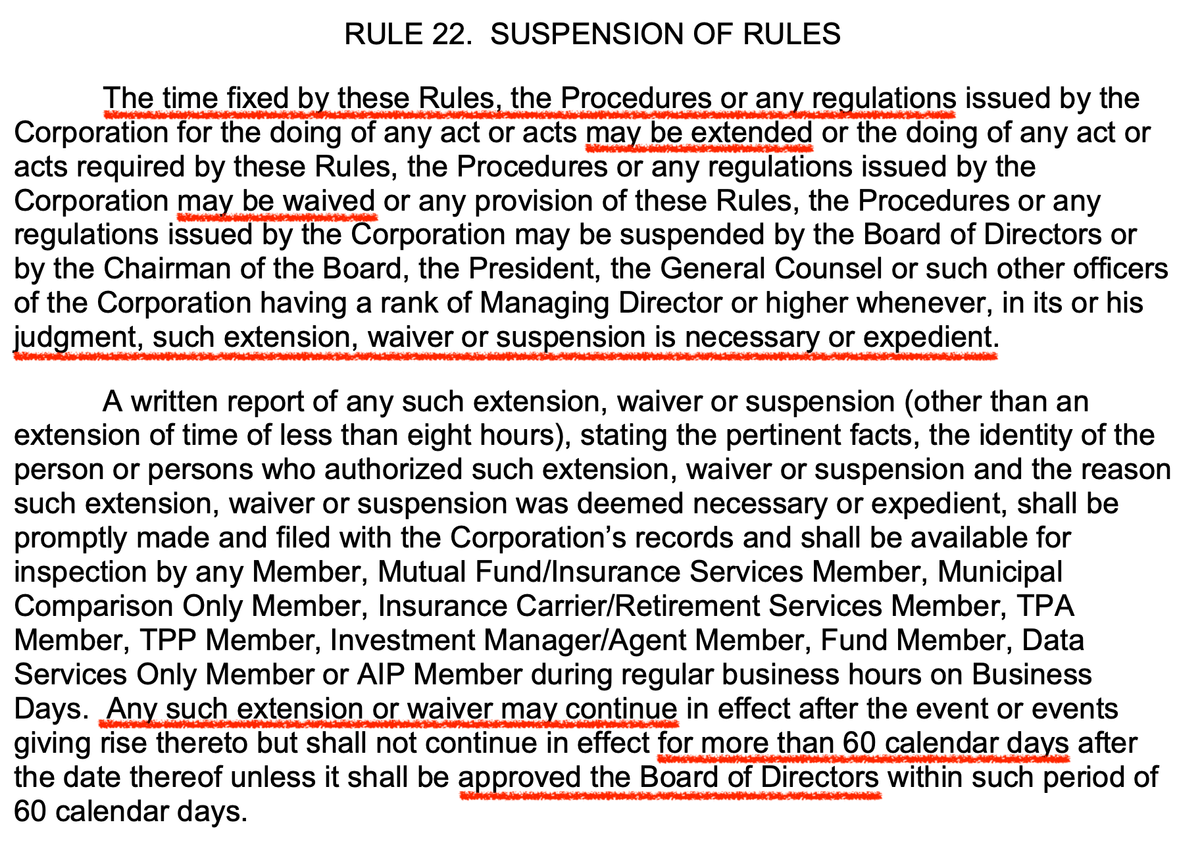Five federal regulatory agencies today requested public comment on proposed guidance addressing reconsiderations of value (ROV) for residential real estate transactions.
Could cause issues if an entity were using overvalued property as collateral in swap transactions to facilitate naked shorting...

https://www.federalreserve.gov/newsevents/pressreleases/files/bcreg20230608a2.pdf
- The Board, CFPB, FDIC, NCUA, and OCC (together, the agencies) are issuing proposed guidance that would highlight risks associated with deficient residential real estate valuations and describe how financial institutions may incorporate reconsiderations of value (ROV) processes and controls into established risk management functions.
- The proposed guidance would also highlight examples of policies and procedures that a financial institution may choose to establish to help identify, address, and mitigate the risk of discrimination impacting residential real estate valuations.
- Deficient collateral valuations can contain inaccuracies due to errors, omissions, or discrimination that affect the value conclusion and can result in either overvaluing or undervaluing real estate collateral.
- The agencies, collectively, do not have existing guidance specific to ROV processes.
- For purposes of the proposed guidance, an ROV is a request from the financial institution to the appraiser or other preparer of the valuation report to re-assess the report based upon potential deficiencies or other information that may affect the value conclusion.
- The agencies have received questions and comments from financial institutions and other industry stakeholders on ROVs, highlighting the uncertainty in the industry on how ROVs intersect with appraisal independence requirements and compliance with Federal consumer protection laws, including those related to nondiscrimination
The proposed guidance describes how financial institutions may create or enhance ROV processes that are consistent with safety and soundness standards, comply with applicable laws and regulations, preserve appraiser independence, and remain responsive to consumers.
The proposed guidance
- (1) describes the risks of deficient collateral valuations,
- (2) outlines applicable statutes, regulations, and existing guidance that govern ROVs and collateral valuations,
- (3) explains how ROV processes and controls can be incorporated into existing risk management functions such as appraisal review and complaint management, and
- (4) provides examples of ROV policies, procedures, and controls that financial institutions may choose to adopt.
How to comment:
- Federal eRulemaking Portal – Regulations.gov: go to https://regulations.gov/ Enter “Docket ID OCC-2023-0007” in the Search Box and click “Search.” Public comments can be submitted via the “Comment” box below the displayed document information or by clicking on the document title and then clicking the “Comment” box on the top-left side of the screen
- Email:
[email protected]. Comments submitted must include “RIN 3064- ZA36” in the subject line of the message. - Email:
[email protected]. - Email:
[email protected] - Mail: Chief Counsel’s Office, Attention: Comment Processing, Office of the Comptroller of the Currency, 400 7th Street, SW., suite 3E-218, Washington, DC 20219.
- You must include “OCC” as the agency name and “Docket ID OCC-2023-2007” in your comment. In general, the OCC will enter all comments received into the docket and publish the comments on the Regulations.gov website
- without change, including any business or personal information provided such as name and address information, e-mail addresses, or phone numbers. Comments received, including attachments and other supporting materials, are part of the public record and subject to public disclosure.
- Do not include any information in your comment or supporting materials that you consider confidential or inappropriate for public disclosure.
They would like thoughts on:
- To what extent does the proposed guidance describe suitable considerations for a financial institution to take into account in assessing and potentially modifying its current policies and procedures for addressing ROVs? a) What, if any, additional examples of policies and procedures related to ROVs should be included in the guidance? b) Which, if any, of the policies and procedures described in the proposed guidance could present challenges?
- What model forms, or model policies and procedures, if any, related to ROVs would be helpful for the agencies to recommend?
- What other guidance may be helpful to financial institutions regarding the development of ROV processes?
- To what extent, if any, does the proposed ROV guidance conflict, duplicate, or complement the existing Interagency Appraisal and Evaluation Guidelines or a financial institution’s policies and procedures to implement those Guidelines?
Potential Comment Points (please remix to make your own!):
1.) To what extent does the proposed guidance describe suitable considerations for a financial institution to take into account in assessing and potentially modifying its current policies and procedures for addressing ROVs?
- The proposed guidance provides a comprehensive set of considerations for financial institutions. As a retail investor, I appreciate its focus on ensuring accurate property valuations and promoting transparency, which contribute to the overall stability of the financial market.
a) What, if any, additional examples of policies and procedures related to ROVs should be included in the guidance?
It might be helpful to include examples that specifically demonstrate how the proposed policies can protect the interests of retail investors.
- For instance, how these measures might prevent misuse of overvalued properties as collateral in derivative transactions.
b) Which, if any, of the policies and procedures described in the proposed guidance could present challenges?
- Some financial institutions might find it challenging to adapt their existing systems and processes to the proposed ROV standards.
- Ensuring the appraisal independence might also be a challenge in certain cases, would love to see the agencies revisit.
2.) What model forms, or model policies and procedures, if any, related to ROVs would be helpful for the agencies to recommend?
I would recommend model forms or policies that lay out clear, step-by-step processes for initiating, conducting, and documenting ROVs.
- This could include templates for documenting the reasons for requesting an ROV and a standard format for presenting the results.
3.) What other guidance may be helpful to financial institutions regarding the development of ROV processes?
Guidance on regular auditing and quality assurance processes related to ROV procedures could be beneficial.
- This will ensure the ongoing effectiveness and compliance of the implemented ROV processes.
4.) To what extent, if any, does the proposed ROV guidance conflict, duplicate, or complement the existing Interagency Appraisal and Evaluation Guidelines or a financial institution’s policies and procedures to implement those Guidelines?
- From a retail investor perspective, the proposed ROV guidance appears to complement the existing Guidelines by adding an additional layer of review and control over real estate valuations.
Any conflicts or duplications would likely depend on the specific policies of the individual financial institution.
- As a layperson, I might not be fully aware of these potential conflicts, and hence would appreciate further clarification from the agencies in a more easily digestible format.
Also, remember this from, checks notes, YESTERDAY? If Commercial craters, what does that mean for residential?:

https://www.reddit.com/r/Superstonk/comments/143mur9/treasury_secretary_janet_yellen_i_do_think_that/
TLDRS:
The Fed, CFPB, FDIC, NCUA, and OCC (the agencies) are proposing guidelines aimed at addressing the risks associated with inadequate residential real estate evaluations.
- These guidelines suggest how financial institutions could integrate reconsiderations of value (ROV) procedures into their risk management operations.
An ROV refers to the reassessment of a property's value based on potential deficiencies or new information that might affect its valuation.
- Inadequate property evaluations can contain inaccuracies leading to overvaluation or undervaluation of real estate collateral.
- These proposals also provide examples of policies and procedures that institutions could adopt to identify and address the risk of discrimination impacting residential real estate valuations.
- Currently, no specific guidelines regarding ROV processes exist, leading to uncertainties among financial institutions about ROV's intersection with appraisal independence requirements and compliance with Federal consumer protection laws.
The proposed guidelines detail deficient collateral valuation risks, outline governing laws and regulations for ROVs and collateral valuations, describe how ROV procedures can be incorporated into risk management functions like appraisal review and complaint management, and offer examples of ROV policies that institutions may adopt.
- The goal is to enhance ROV processes, preserve appraiser independence, and ensure institutions remain consumer-responsive while complying with laws and maintaining safety and soundness standards.
How could this relate to GameStop?
The proposed guidance by the agencies is aimed at improving the accuracy and reliability of residential real estate valuations. Mispriced property valuations could potentially be used as a loophole in various financial transactions, including the use of these properties as collateral in derivatives transactions like swaps. Here's how the new rules could potentially impact such a scenario:
More Accurate Collateral Valuations: Deficient valuations can result in overvaluing or undervaluing real estate collateral.
- The proposed guidance aims to minimize these inaccuracies, ensuring collateral values used in swaps or other transactions are more accurate and reflective of the market.
Incorporation of Reconsiderations of Value (ROV) Processes: If a financial institution suspects a valuation is inaccurate, they can request an ROV, prompting the appraiser to reassess the report.
- This would make it harder to use an overvalued property as collateral, as the reassessment could reveal the true, lower value.
Stronger Risk Management: The guidelines also propose stronger risk management and review processes.
- This would potentially catch and rectify issues such as mispriced collateral more quickly.
- If a person or entity were using overvalued property as collateral in swap transactions to facilitate naked shorting, these guidelines could disrupt their strategy by ensuring the property is valued correctly.
- However, these guidelines alone may not be sufficient to fully prevent naked shorting via swaps or other derivatives, as they are primarily focused on improving the reliability of property valuations--hopefully the proposed rules from the SEC and CFTC yesterday do the rest!



